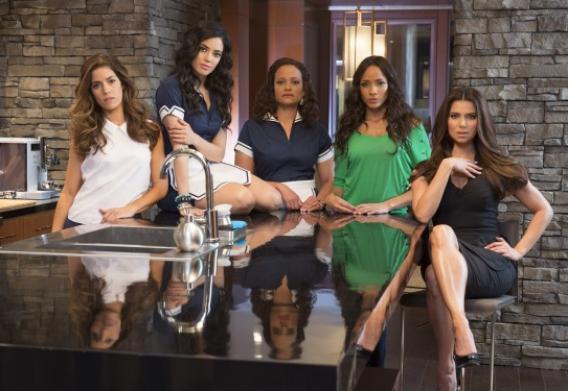At the beginning of May, Huffington Post blogger Tanisha L. Ramirez denounced Devious Maids as a “wasted opportunity,” pointing out that while the show’s five lead characters are Latinas, they’re all domestic workers. Despite her criticism, she almost certainly did the show a huge favor. Ramirez’s slam provided executive producer Eva Longoria with a chance to respond, and the resulting debate about whether Devious Maids presents outdated stereotypes of contemporary U.S. Latinas surely made thousands of potential viewers aware of the show’s existence.
Unfortunately, if any of those people check out the first episode on Lifetime this Sunday, they’ll discover a parade of utterly predictable stereotypes—of Latina maids who are both devious and pure of heart, and of their Caucasian employers, who are all selfish, utterly detestable, entitled snobs.
The premiere begins with a brittle Beverly Hills hostess telling her maid, “I think what you people do is heroic. You wash clothes you can’t afford. You polish silver you will never dine with. You mop floors for people who don’t bother to learn your name.” So far, so self-aware and semi-sympathetic. Then Evelyn Powell informs Flora, “That said, if you don’t stop screwing my husband, I’m going to have you deported.”
When Flora turns up dead a couple of scenes later, there’s no doubt that Devious Maids is a Marc Cherry production. Cherry’s last big hit, Desperate Housewives, which ran for eight seasons on ABC, also began with a mysterious death in a female-dominated world … where nothing is quite as it seems. Cherry originally developed Devious Maids, based on the Mexican telenovela Ellas Son la Alegría del Hogar, for ABC, and the fact that the network chose to pass on a project from a guy who played a key role in its resurgence in the early 2000s (at least according to Bill Carter’s 2006 book Desperate Networks) gives a sense of what weak sauce it is. Especially when that same network has since put shows like Zero Hour and Mistresses on the air.
That sense of having seen things before—albeit with more snap, crackle, and pop last time around—extends to the cast. Four of the actresses playing the titular maids have had regular gigs on big network shows: Ana Ortiz in Ugly Betty, Dania Ramírez in Heroes, Judy Reyes in Scrubs, and Roselyn Sánchez in Without a Trace. Even when they’re delivering performances more compelling than the writing deserves, you can’t help noticing how much better they were in those other roles.
With the exception of Ortiz. As Marisol Duarte, who seems too good to be true when she applies for a job as the live-in maid for the Powells’ neighbors, Ortiz gets to be more than just a put-upon servant. Unlike her sisters in service, it takes more than two sentences of dialogue to figure out where she fits into the soapy scheme of things. The others are too obviously desperate, driven, destined for heartbreak, or overprotective. Marisol gets to retain a sense of mystery all the way to the end of the first episode.
But a good TV drama about maids has, suffice it to say, yet to be made. And someone should make it! Class and race remain tragically underexplored topics on television. They deserve to be treated with a modicum of realism. For all its predictability, the worst sin of Devious Maids is that it repeatedly shows the maids sassing their employers, sharing leisurely lattes in fancy cafes, or gossiping around picnic tables. Just because they work in Beverly Hills doesn’t mean they can afford to socialize there, or that they would be made to feel welcome. The fact that Marc Cherry doesn’t seem to understand any of that is the most obvious indication that he has no idea what maids’ lives are like, devious or otherwise.
